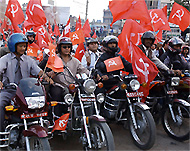Nepal king calls for calm
Facing growing protest against his direct rule, the king of Nepal has called for peace and urged opposition factions to work for an end to conflict in the country.

The plea from King Gyanendra came as police arrested hundreds more protesters defying a government ban on rallies on the second day of an opposition-led general strike.
“Let us all pledge today to devote time for establishing permanent peace,” the monarch said in a speech broadcast live on national television and radio from Birgunj, about 200km south of Kathmandu on Friday.
“It is the need of today to establish permanent peace,” the king said, addressing a Hindu conference.
It was the first comment by the monarch on the protests as pro-democracy activists, political parties and escalating violence from Maoist rebels puts him under increasing pressure.
The king did not refer to the dozens of protests in the capital, Kathmandu, and other parts of the country or the four-day general strike called to urge him to restore democracy.
Clashes
|
“Let us all pledge today to devote time for establishing permanent peace” King Gyanendra of Nepal |
As the king delivered his speech, hundreds of protesters clashed with police in Kathmandu and at least 150 were arrested.
Many of the protesters were students who hurled bricks and stones at police, who responded with tear gas.
The main clashes took place early on Friday in the narrow streets of the Patan neighbourhood.
Another demonstration and further arrests took place in the centre of the capital.
Absolute power
 |
|
Opposition groups have promised |
Opponents of King Gyanendra vowed to come out in vast numbers on Friday as they intensify pressure on him to give up absolute power.
The government had ordered security forces to do whatever was necessary to stop the protests.
On Thursday more than 300 activists who defied the ban on rallies in the capital were arrested by police.
Kofi Annan, the UN secretary-general, has criticised the government clampdown, saying citizens have the right to protest peacefully.
Authorities say the ban is needed because Maoist rebels could use such rallies to incite violence.
King Gyananendra sacked the government and seized power in February last year, plunging Nepal into political turmoil.
The king says that he took power because of politicians’ failure to tackle an insurgency by Maoist rebels that has claimed the lives of about 13,000 people since 1996.